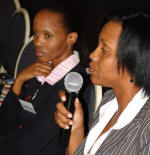|
March 2007
 GABORONE - Tuberculosis notification rates remain higher among men in
Botswana, but the impact of the disease may actually be harder on women and
girls, according to presenters at a seminar on gender and its relationship
to TB and AIDS. GABORONE - Tuberculosis notification rates remain higher among men in
Botswana, but the impact of the disease may actually be harder on women and
girls, according to presenters at a seminar on gender and its relationship
to TB and AIDS.
BOTUSA and the U.S. Embassy teamed up with the Botswana Women Media
Association (BOMWA) for the one-day seminar to commemorate two important
days in March: International Women's Day and World TB Day.
More than 50 women working as home based care officers, family welfare
educators, councilors and media practitioners, participated in the March
27th educational event.
Officially opening the seminar, Botswana Minister of Health Professor Sheila
Tlou said that 57 percent of notified TB cases in Botswana were males and 43
percent were females. However, Tlou said, TB may affect women and men
differently because of gender differences in the division of labor and in
roles and responsibilities.
The impact of a woman who falls sick will be strongly felt by her children
and entire family, Tlou said. TB also enhances the risk of miscarriage or
stillbirth during childbirth, and can even lead to infertility in women.
"Women patients report an inability to spend time on childcare, difficulty
in carrying out household chores because of deterioration in their physical
conditions," Tlou said.
 Dr. Robert Makombe, the HIV/TB Program Officer at BOTUSA who presented on
gender dimensions of the disease, said TB remains a leading cause of death
among women in Botswana and tends to affect women mainly in their
economically reproductively active years. Every year, he said, 3 million
women develop TB and 750,000 women die of TB worldwide. Dr. Robert Makombe, the HIV/TB Program Officer at BOTUSA who presented on
gender dimensions of the disease, said TB remains a leading cause of death
among women in Botswana and tends to affect women mainly in their
economically reproductively active years. Every year, he said, 3 million
women develop TB and 750,000 women die of TB worldwide.
Makombe also pointed out that there is a strong correlation between HIV/AIDS
and TB. In Botswana, it is estimated that 60 to 80 percent of TB patients
are co-infected with HIV. Women, especially younger women, are therefore at
higher risk of developing disease because of their higher risk of HIV
infection.
Women should be encouraged to know their HIV status and, if infected, to be
assessed for TB and TB preventative treatment, he said. They should also be
encouraged to present for TB screening at the first sign of symptoms.
U.S. Embassy Deputy Chief of Mission Philip Drouin noted that the United
States, through the President's Emergency Plan for AIDS Relief (PEPFAR), was
supporting programs that fully integrate HIV prevention, treatment and care
with TB services.
By the end of September 2007, PEPFAR had supported care for approximately
301,000 TB/HIV co-infected people in 15 PEPFAR focus countries, including
Botswana.
|